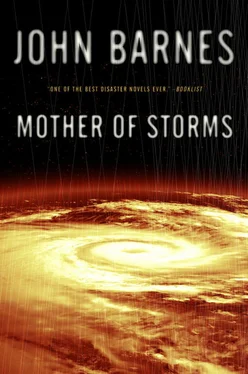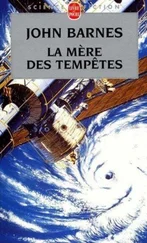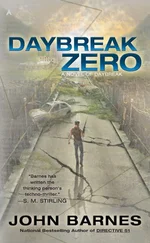Finally, the only thing that seemed to limit the Global Riot was that most people preferred to stay home and wear the goggles and muffs so that they could experience violence and destruction worldwide with their full concentration, instead of having it be background music for their own rioting.
As it was, at least half a million people worldwide died while plugged into XV, not realizing that while they popped back and forth between the firestorm in Seoul, troops going berserk in Denver, liquor-store looting in Warsaw, and the ever-popular gang rapes in Montevideo, the building was burning down over their heads. There were nine million dead in total, worldwide, not counting suicides afterward, crashes of fire trucks and ambulances trying to get to the trouble, or heart attacks while experiencing it all on XV.
So far nobody has figured out any way to prevent the next Global Riot. Di understands perfectly well what Henry is worried about. Supposedly UNIC has gotten equipped to grab net control and shut down global communications if need be, but after seeing them unable to shut down Abdulkashim earlier tonight, Di knows that’s strictly propaganda.
All this comes to Di as one big impression while he swallows hard. “All right, then, Henry,” he says. “Offhand I’d say a methane release that big is going to have effects and people are going to notice. Methane is one of the major ways the Earth traps heat, and it’s letting loose right before spring equinox in the Northern Hemisphere. It’s going to warm up a lot faster than usual this spring. You’ve got to make them understand this won’t just blow over and can’t be kept secret. So… how much how fast? You said a hundred and fifty to two hundred billion tons—is that firm?”
“That’s the estimated volume in the beds that have already gone,” Henry says, “and since to some extent they seem to be able to set each other off mechanically, it’s probably low. How fast—I don’t know. How long does it take a not very dense gas to rise to the surface? It’s not very soluble in water, so we won’t get much help from its dissolving; besides, I suppose whatever dissolves is just going to block the absorption of other methane from other sources later. As for finding its way through the ice—you want my bet? I bet it didn’t take an hour to get to the undersurface of the ice. And there are so many cracks and fissures, big and little, that I don’t expect it to stay under the ice more than two or three hours. We thought about flaring the pockets—use missiles to punch holes and set the stuff on fire—but the collapse after the pocket goes will probably break the ice up more and let other methane escape. I guess we’ll do it so that it looks like we tried, but we don’t expect it to accomplish anything. So very unofficially, figure it’s all in the air tomorrow.”
Di gives a low whistle, leans back, reaches for his terminal, unfolds it onto the table in front of him. “I’ll have to get back to you—and I need numbers, accurate ones, soon. I can do some preliminaries on it pretty fast. And you’re right, we need the old Anticipatories.”
He thinks for one moment of pointing out that it was Henry who let them cut out the “Wild Thinkers” on grounds that the things the Anticipatory Section dreamed up were mostly not going to happen and tended to scare the daylights out of voters and taxpayers.
But after all, the alternative was cutting Henry, and then they’d have ended up with a worse hack, so Di just adds, “If I remember right, there’re several processes that take methane out of the atmosphere—”
Henry nods. “Right. We might look into which ones can be accelerated or altered—”
“Wasn’t thinking that far ahead. It matters how long the stuff stays at elevated concentrations. If it’s only a couple of days, not much will happen, but if it’s twenty years, then we’re in deep.”
“Got you.”
“And Henry—you really ought to see about getting everyone back from Anticipatory. Most of the people you have left are just amateurs at this.”
Henry almost looks happy, and says, “I’m way ahead of you there, at least. Next person I talk to after you is Carla Tynan. And I intend to beg, plead, and whine until she agrees to head up the research on this—whatever it takes. Then I’ll beg, plead, and whine some more so they’ll okay hiring her.”
Di Callare has to smile. “That’s going to take some whining. ”
“You know it. But we don’t have anyone else who knows as much about the weird connections that might be out there.”
“Well, I look forward to working with her again. You can learn a lot.”
“Unh-hunh. Some of it about meteorology and global climate. All right, guess I better call Hardshaw back first, then get to Carla. You take care and we’ll talk whenever one of these sleepyheads in here comes up with any of the numbers you asked for. Get some sleep tonight… might not be another good chance for a while.”
Henry pings off, and Di turns around to find Lori has been listening, out of sight of the phone’s camera. “You got that?”
“Yep.” She unfastens a button and winks at him more blatantly than he’d have thought possible. “And you heard your boss. Better take your chances while you’ve got them….”
In the middle of the twentieth century, the phone company learned to sell the dead time on a line, if there were enough lines. That is, if people make noise into the phone line only eighty percent of the time, then if you can switch conversations off as soon as someone falls silent, reconnect them through the first available line as soon as there’s any sound, and do it all fast enough so that no one notices the brief cutting off of the beginnings of sounds—well, then, you need only four lines per five conversations.
In the mid-1960s, to maintain communications in the event of a nuclear war, USDoD came up with ARPAnet, which begat Internet, a term you still hear old people call it in their boomtalk, instead of just “the net” it has evolved into, a system for moving e-mail in which each message knows where it is going and wanders from node to node in a network, taking every opportunity to get closer to its destination.
By 1990, intelligence organizations were using the splitting up of messages across multiple channels to make it impossible to monitor a conversation; one split second of it went across the country from microwave tower to microwave tower, the next split second went through an unused TV channel on a satellite, the next jumped around the world on satellite-to-satellite relays, and it all got together at the phone.
By 2028, that technique is no longer used for security; it’s simply the most efficient way to use the trillions of fibrop pathways and laser groundto-satellite links. But it has the same effect: nothing and no one can jam information as long as it’s coming from and going to enough different places at once. You can keep any one person from talking or listening… but that’s all.
And the same trillions of channels are the ones on which the UN, the governments, and the corporations depend. They can no more unplug than you can stop breathing; or rather the cost of doing either would be the same.
It’s afternoon in the Western Pacific and the weather is pleasant and warm. Carla Tynan has brought her yacht up to the surface to spend a while sunbathing on the deck. A few years ago, when she had the NOAA job, she put most of her savings from her software patents into getting her skin cancer-proofed, so she could enjoy the sun no matter what happened to the ozone, and into MyBoat, her submersible yacht.
That meant she was officially broke, which badly upset Louie, her husband at the time, though she certainly hadn’t touched his money or even asked for any of it.
Читать дальше












